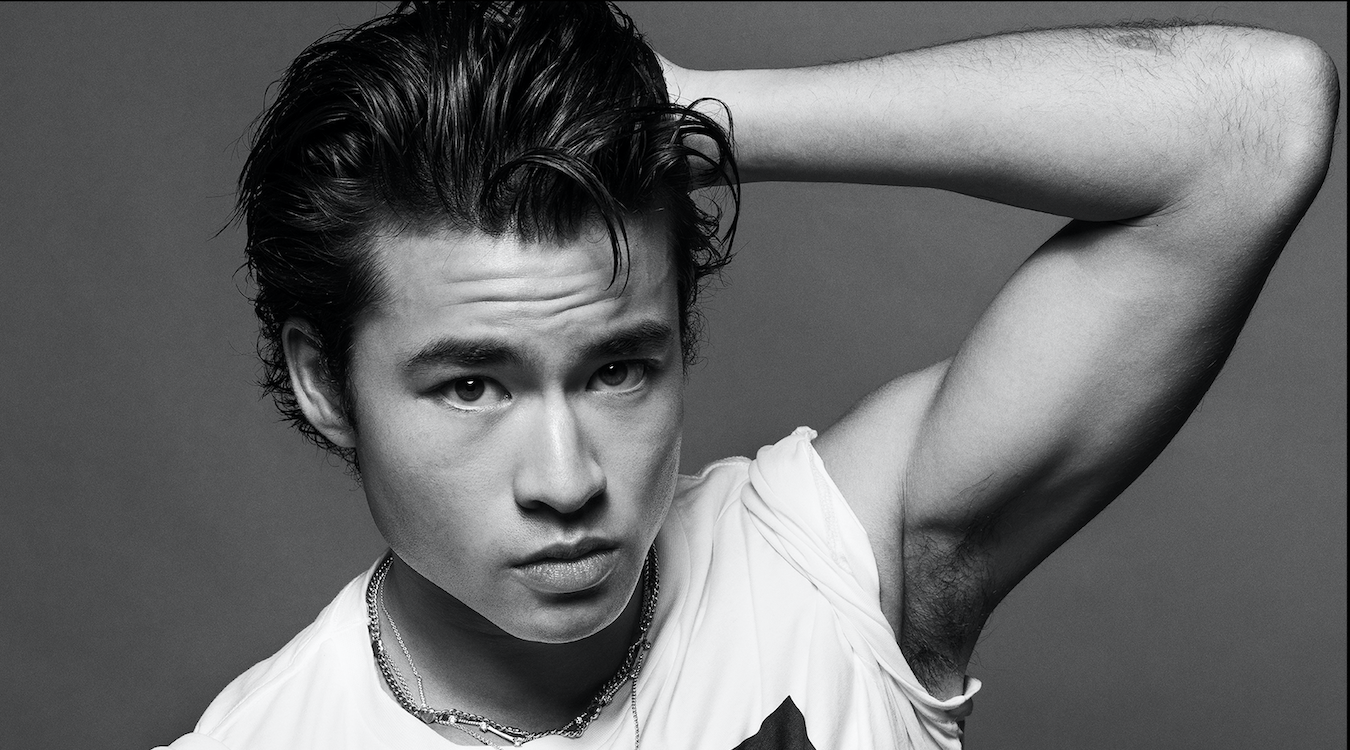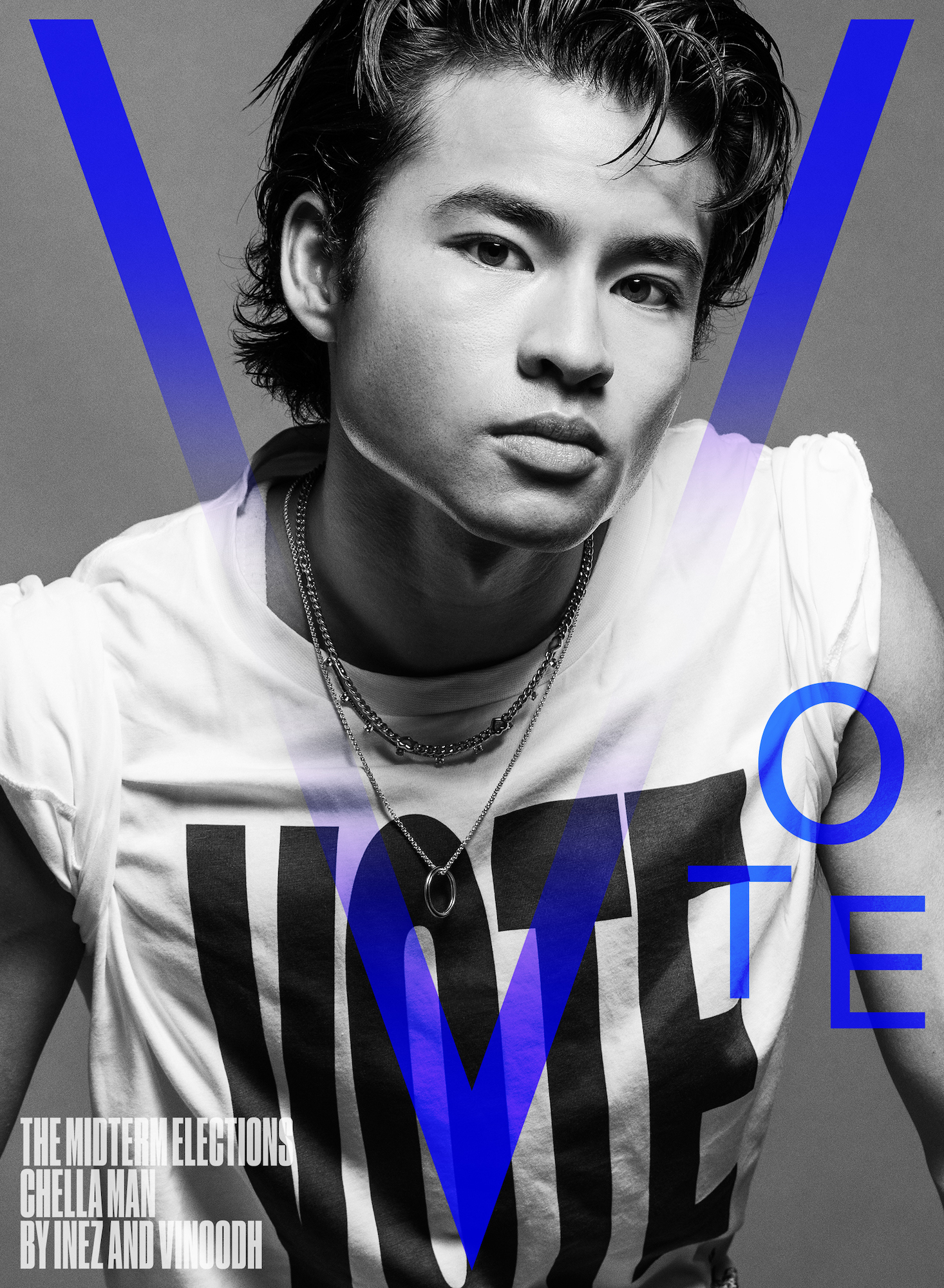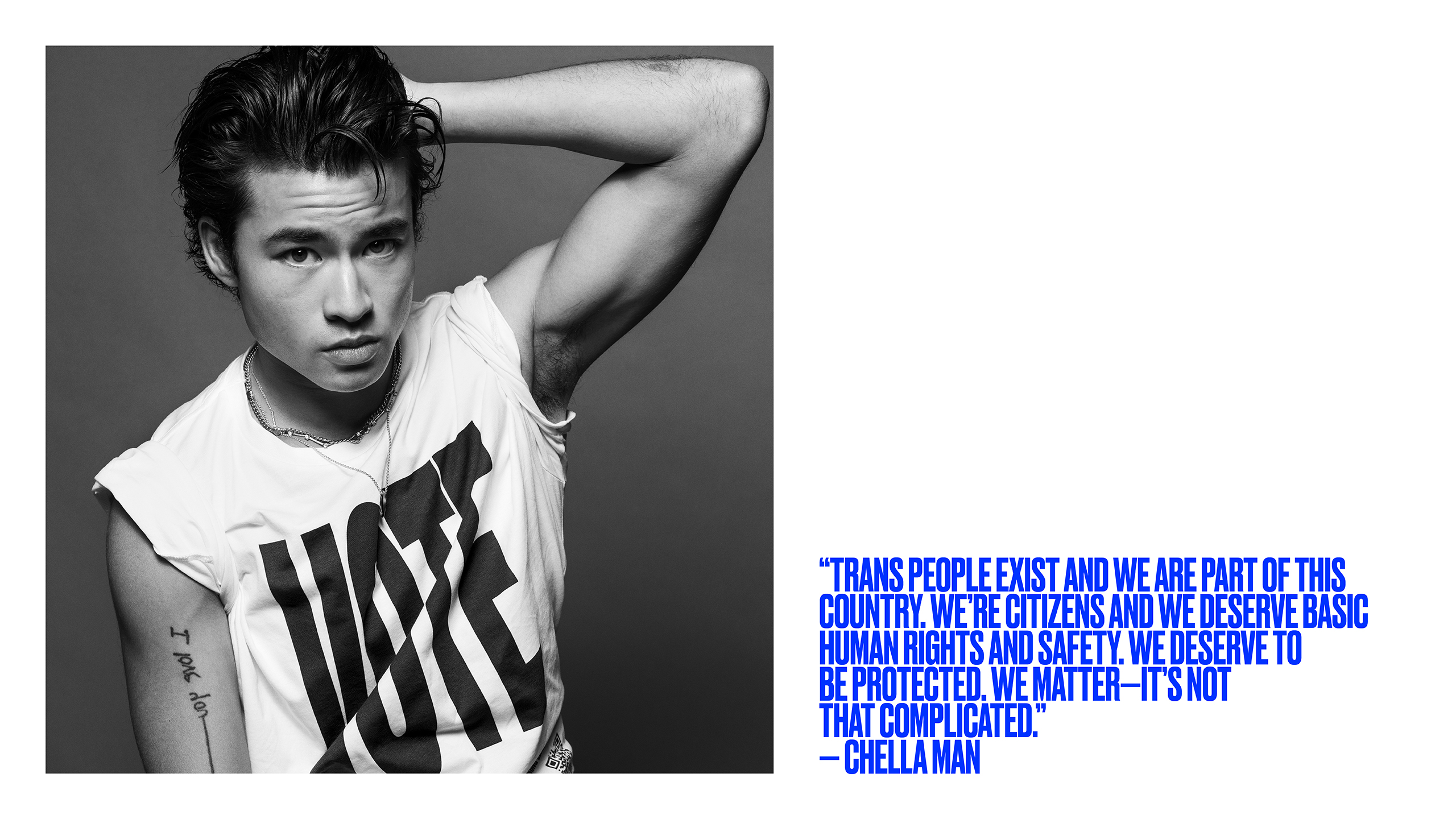Midterm Elections 2022: Chella Man
The artist, actor, and disability activist tells V about the importance of practicing activism in everyday life

The 2022 midterm elections put the fates of many marginalized voices on the line, a fact that can be deeply unsettling. Chella Man knows this first-hand. A proud non-binary/trans masculine and disability activist, Chella Man is forced to confront his identity groups on a daily basis. But, within all that, joy. After finding community upon moving to New York City from central Pennsylvania, Chella has catapulted himself to a pubic-facing career in art, modeling, and acting. Having racked up modeling gigs for Calvin Klein, and American Eagle, and a starring role in DC’s Titans, Chella may just recognize the movement of pop culture toward the new, the inclusive. That would not exist without fighting tooth and nail every day, for both himself and others.

For Chella Man, voting is beyond necessary. V‘s Kevin Ponce and climate and voting activist Saad Amer got the chance to sit down with Chella to discuss the accessibility of voting, the urgency of the present, and just what activism looks like in all of our lives. For Chella Man, the impetus to vote is crystal clear: we vote for safety, we vote for rights, we vote to reclaim our power.
Discover the full conversation, below:
Saad Amer: Obviously right now a big election is coming up, and is very important across this country. Why do you find this moment right now so important?
Chella Man: Due to technology and social media, marginalized groups are more visible than ever. And, unfortunately, visibility is not safety. On the contrary, it can put us at risk for new obstacles of violent actions stemming from fear. Voting is one powerful way we can exercise our right to protect ourselves and our community. It is a right that many of us (BIPOC, disabled, anyone not a cisgender man) have not always had. If it’s accessible to you, I encourage you to exercise your right to vote.
SA: There are so many extra barriers for disabled people. What are some things that people don’t think about with your community when they’re going out to vote?
CM: Beyond the polls, non-disabled individuals rarely think about how disabled people have to navigate life in general. It is a perpetual battle of repetitive advocating. It’s like, where do I begin? Everything with anti-trans legislation. This is a great website to help take action: TrackTransLegislation.com.
Additionally, most are unaware disabled individuals still do not have marriage equality as those on Supplement Security Income (SSI) can only have up to $2000 in assets. Beyond this, that person could lose their disability benefits.
Kevin Ponce: Are there any methods that disabled people can take to avoid certain obstacles when voting? Do you have any tips?
CM: I think it’s ridiculous, in this day and age, that there’s not this electronic way that we can vote. That would be incredibly accessible. For some disabled people, just mailing in an absentee ballot can be tedious. Maybe they can’t write it themselves, transport to a post office, or perhaps they are in a health crisis. Having an electronic way to vote would increase the amount of people disabled or not who would vote, allowing for a more accurate representation of desires.
SA: We were just touching on trans rights and obviously there’s a big anti-trans movement that has re-erupted in this country. I’m sure you must have some big thoughts on this. How do you think that is impacting this election right now?
CM: I don’t even think it’s re-erupted. Anti-trans discrimination has been around since the dawn of time, but now with visibility—people are more aware of it. As I mentioned above, this creates new conflicts online and off. There are new forms of anti-trans discrimination, but the root of this discrimination is nothing new. Trans people are a part of this country. We’re citizens. We are humans who are deserving of basic human rights. To which I mean, we deserve to be and feel safe. We deserve to be protected. We matter—it’s not that complicated.

KP: The thought of having our rights be in the hands of people who can’t think that way is nearly an inhuman approach. Having our fate in their hands is unthinkable for most.
CM: I mean, I grew up in central Pennsylvania, and many people surrounding me were Trump supporters. It wasn’t fun. My best friend from Central Pennsylvania as well is a reason I am still alive. We had each other in that small town and it was all we knew for like 17 years. I didn’t realize that there were people who had that level of true empathy before I met them. Community is everything.
KP: It’s all about communities and chosen family. Within your own community, what are you seeing in terms of the passion brewing for the midterm election?
CM: I think on social media, Generation Z truly has begun to understand how to utilize social media as this beautiful collective, almost…weapon, against the mass media outlets. So that’s where I see it more than ever. I mean, V Magazine is a huge outlet and there’s so much controversy over politicizing your media. So it gives me hope that people behind large brand names are beginning to realize politicization is not a choice; there are and always have been people’s human rights being stripped away or never given to them in the first place. If they care about people, if they care about humanity, which is art, which is culture, which is food, fashion, everything, it has to be political. You can’t separate it.
SA: You just said something really profound about how it is scary to have these elected officials who are representing you but don’t even see you as a person and don’t look at your humanity when creating policy that legislates your whole life. Have you ever felt represented by our elected officials?
CM: Parts of me, yes. But there’s never been a place that fully understands who I am. I’ve still struggled to find that even in communal spaces. Accepting that the space we’re in the world right now requires a lot of unfortunate compromises on my end, which is a fact I may never make peace with. On the contrary, I must reject; this is how we create revolutions.
SA: Do you feel like you are always having to compromise?
CM: Yes. But at the same time, I’m able to create pockets of liberation within my community. Within these spaces here, I feel understood. I can use whatever bathroom. I can actively voice my needs and have them be validated rather than dismissed or erased. Definitely can’t say that [for] congress. I will say though, I do feel very represented by certain disability and trans-BIPOC activists like Chase Strangio and Judith Heumann. And there are internal changes at the White House – Claudia Gordon, a Black Deaf woman, was just appointed to serve on the National Council on Disability. This win gives me a lot of hope because I swear, I don’t think that any time before now would not have happened.
KP: Do you still feel hopeful?
CM: I do. That’s also such a huge question, right? What am I hopeful for? What do I think is realistic? What do I see becoming true in my lifetime? What have I made peace with letting go that I will never see in my lifetime? But it may [all] still happen, you know? I’m truly just presently leaning into the spaces that we feel liberated in now because that’s what we have to do. We were not born to fight. We were born to enjoy our lives. Our worth is not in our fight. I think that a lot of us who are marginalized and [have] experienced perpetual, redundant discrimination start to believe that we are worthy because of the amount of activism we do or because of how often we stand up, but we deserve rest. That is also the greatest source of activism.
SA: I totally agree with you. There’s such a fight-or-flight mentality that we all have and adopt everywhere that we go. Never knowing when someone is gonna snap. You lose that sense of safety and then you relinquish your sense of self to their anger and you just have to figure out how to walk away and be safe.
CM: Absolutely. I mean, it’s a continuous balance and acceptance; it is not your responsibility at certain times. Activism work can feel forced onto us when there does not feel like any way to safety. Push back or be hurt. I strive for my activism work to stem from a grounded, intentional place for myself [at least]. I think it could be whatever anyone else wants it to be, but I realize I am the most powerful when I am fully consenting to the work I am doing.
Midterm Election Day is November 8th!
If you’d like to vote in person for this election, make sure you’re registered and plan ahead so you have the time to go and vote!
Have you reminded your friends? Bring them with you!
Find your polling place, see what’s on your ballot, check your registration, and more at Vote.org!
[The t-shirts worn in this latest series of V IS FOR VOTE have been designed by Katharine Hamnett. A portion of sales from each shirt sold helps directly benefit the United Nations Development Programme (UNDP). For more information, visit WeAreTheFutureSDGS.com.]
Discover More
